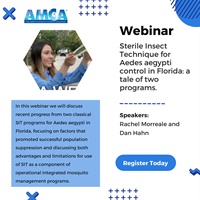Sterile Insect Technique for Aedes aegypti control in Florida: a tale of two programs.
- Average Rating:
- Not yet rated
- Categories:
- Webinar Archive
- Faculty:
- Rachel Morreale | Dan Hahn
- Course Levels:
- All Levels
- Duration:
- 1 Hour Session
- Format:
- Audio and Video
- License:
- Never Expires.
Description
The sterile insect technique (SIT) is a species, specific autocidal method of insect pest control. In SIT, large numbers of male insects are grown in a laboratory and separated from females that are eliminated. Males are then sterilized - typically by radiation such as x-rays - and released into the field to mate with wild females, thus preventing them from producing larvae. Additional variations on this theme of classical SIT include Wolbachia-based incompatible insect technique and various transgenic approaches to population suppression. In this webinar we will discuss recent progress from two classical SIT programs for Aedes aegypti in Florida, focusing on factors that promoted successful population suppression and discussing both advantages and limitations for use of SIT as a component of operational integrated mosquito management programs.
Outline of Talk:
- The problem with Aedes aegypti
- History of SIT & prior use with mosquitoes
- Study One: Developing a SIT program in Lee County, FL
- Population monitoring
- Building the infrastructure
- Mark-release-recapture studies
- Operational population suppression
- Study Two: Developing a SIT program in St. Johns County, FLA.
- Population monitoring
- Infrastructure
- Mark-release-recapture studies
- Operational population suppression
- Conclusions: Suggestions for moving forward and making this easier and more widely available to mosquito control districts, including current challenges and suggestions to overcome them.
AMCA Members - This archived webinar along with all AMCA webinars is available free to our active members. We are currently syncing this new system with our database to have seamless identification of our members, but until that is finalized you can access all webinars (live and archived) for free using our membership code which can be found in our member portal here.
Faculty
Rachel Morreale Related Seminars and Products
Lee County Mosquito Control District
Manager, Applied Science and Technologies
Rachel Morreale leads the sterile insect technique program at Lee County Mosquito Control District. She received a Bachelor of Science from the University of North Florida and upon completion of her undergraduate studies, Rachel worked as a Seasonal Surveillance Assistant for LCMCD where she learned about the importance of mosquito control. In 2014, she earned a Master of Science in biology focused on medical entomology from Georgia Southern University. Upon returning to LCMCD, Rachel worked as Field Validation Biologist, in which she oversaw the Insecticide Susceptibility Program, conducted droplet characterization tests on the ground and aircraft fleet, evaluated new products, and researched techniques to improve current mosquito control methods. As the Applied Science and Technologies Manager, Rachel has developed the sterile insect technique program for LCMCD from its inception in 2017. She has directed the establishment of population surveillance, mass rearing of Aedes aegypti, and sterilization on male mosquitoes for releases. She constantly works to further the program’s goals of mosquito suppression and for the advancement of SIT with colleagues around the world.
Dan Hahn Related Seminars and Products
University of Florida
Professor, Department of Entomology and Nematology
Dan Hahn has worked with sterile insect technique in agricultural insect pests for more than a decade and has recently begun working on mosquitoes in collaboration with Lee County Mosquito Control District, Anastasia Mosquito Control District, and USDA-ARS-CMAVE. Dan has a Bachelor of Science from Florida State University, a PhD in Insect Science from University of Arizona, postdoctoral experience at Ohio State University, and has been at University of Florida since 2005. Although Dan is an evolutionary physiologist by training, he has become increasingly interested in using basic principles of physiology and microevolution in pest management, such as using physiological treatments to improve the performance of sterile male insects.
